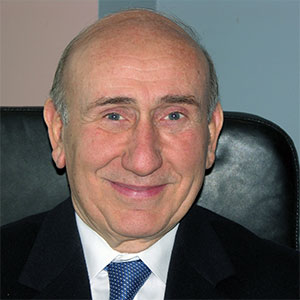Evangelos Gragoudas, pioneer in the treatment of eye tumors, to speak at OU
The lecture will take place at noon on Friday, Sept. 27, in the Oakland Center Gold Rooms


Evangelos Gragoudas, M.D., who pioneered the use of proton therapy for the treatment of eye tumors, and photodynamic therapy for the treatment of age-related macular degeneration, is the speaker for Oakland University’s 2019 Harding Lecture. The event will take place on Friday, Sept. 27 in the Oakland Center Gold Rooms, with a reception starting at 11:30 a.m. and the lecture to follow at noon.
Evangelos Gragoudas, M.D. |
Dr. Gragoudas is the Charles Edward Whitten Professor of Ophthalmology at Harvard Medical School and Distinguished Director of the Retina Service at the Massachusetts Eye and Ear Infirmary. He is an internationally recognized authority on the diagnosis and management of intraocular tumors, which will be the topic of his lecture. Michael Trese, M.D., an adjunct clinical professor in Oakland University’s Eye Research Institute, invited Dr. Gragoudas to present this year’s Harding Lecture.
“Dr. Gragoudas has been a leader in ocular oncology for many years and a mentor and teacher to many outstanding ophthalmologists,” Dr. Trese said. “We are privileged to have him present this year’s Harding Lecture.”
Dr. Gragoudas worked with a group of ophthalmologists to demonstrate the critical role of vascular endothelial growth factor (VEGF) in ocular neovascularization and went on to develop therapies targeting VEGF for treatment of AMD. For this work, he and his colleagues recently received the prestigious Champalimaud Vision Award, which some consider to be the “Nobel Prize” in vision research.
His early translational work focused on uveal melanoma, for which he pioneered the use of proton beam irradiation – a highly successful treatment that has been used in over 15,000 patients as a proven and safe alternative to removal of the eye. He has also published more than 200 articles in peer-reviewed journals and authored more than 100 chapters, reviews, and books.
His other honors include the Academy Honor Award and the Senior Achievement Award from the American Academy of Ophthalmology; the Jules Gonin Lectureship of the Retina Research Foundation; the Senior Scientific Investigators Award from Research to Prevent Blindness; the J. Donald M. Gass Medal and the Arnall Patz Medal of the Macula Society; the Harvard Medical School Distinguished Alumni Award; and the Mildred Weisenfeld Award for Excellence in Ophthalmology from the Association for Research in Vision and Ophthalmology (ARVO). He was also named to the Ophthalmologist Power List of the 100 most influential people in ophthalmology, in 2014 and 2016.
Dr. Gragoudas received his medical training in Athens, Greece and completed ophthalmology residency training at Boston University School of Medicine. He joined the full-time faculty at Mass. Eye and Ear in 1975 and has served as Director of the Retina Service since 1985. He was promoted to Professor of Ophthalmology at Harvard Medical School in 1994.
The event is free and open to the public. For more information, and to RSVP, contact Jacqueline Hencsie at [email protected].
About the Harding Lecture
The Harding Lecture Series honors the memory of husband and wife Dr. Clifford V. and Dr. Drusilla R. Harding, OU biology faculty members who played a pivotal role in shaping Oakland University in its early years. It was established in 2015 through an endowment set up by the couple's children.
Clifford V. Harding was the founding chair of OU's Department of Biological Sciences, the university's first vision researcher and a leader in developing the plan to establish the Eye Research Institute at Oakland. This annual lecture series brings experts to campus who reflect the Harding’s passion for scholarly achievements in biology and eye research.


 September 6, 2019
September 6, 2019